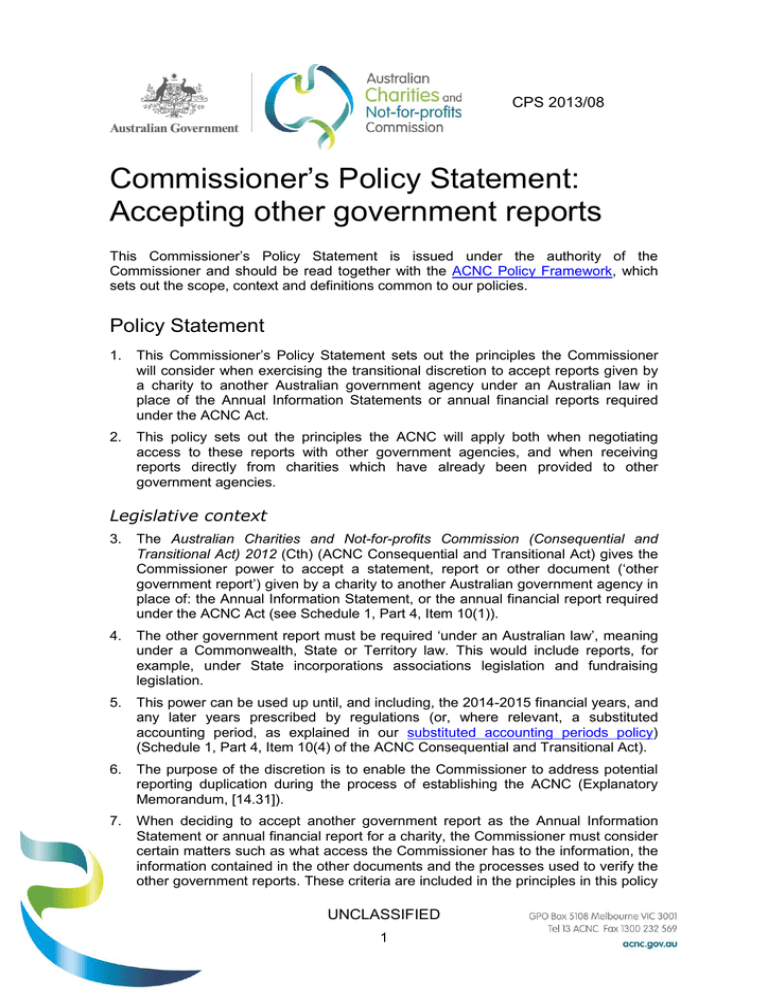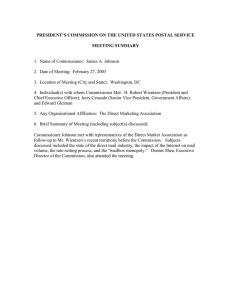Commissioner`s Policy Statement: Accepting other
advertisement

CPS 2013/08 Commissioner’s Policy Statement: Accepting other government reports This Commissioner’s Policy Statement is issued under the authority of the Commissioner and should be read together with the ACNC Policy Framework, which sets out the scope, context and definitions common to our policies. Policy Statement 1. This Commissioner’s Policy Statement sets out the principles the Commissioner will consider when exercising the transitional discretion to accept reports given by a charity to another Australian government agency under an Australian law in place of the Annual Information Statements or annual financial reports required under the ACNC Act. 2. This policy sets out the principles the ACNC will apply both when negotiating access to these reports with other government agencies, and when receiving reports directly from charities which have already been provided to other government agencies. Legislative context 3. The Australian Charities and Not-for-profits Commission (Consequential and Transitional Act) 2012 (Cth) (ACNC Consequential and Transitional Act) gives the Commissioner power to accept a statement, report or other document (‘other government report’) given by a charity to another Australian government agency in place of: the Annual Information Statement, or the annual financial report required under the ACNC Act (see Schedule 1, Part 4, Item 10(1)). 4. The other government report must be required ‘under an Australian law’, meaning under a Commonwealth, State or Territory law. This would include reports, for example, under State incorporations associations legislation and fundraising legislation. 5. This power can be used up until, and including, the 2014-2015 financial years, and any later years prescribed by regulations (or, where relevant, a substituted accounting period, as explained in our substituted accounting periods policy) (Schedule 1, Part 4, Item 10(4) of the ACNC Consequential and Transitional Act). 6. The purpose of the discretion is to enable the Commissioner to address potential reporting duplication during the process of establishing the ACNC (Explanatory Memorandum, [14.31]). 7. When deciding to accept another government report as the Annual Information Statement or annual financial report for a charity, the Commissioner must consider certain matters such as what access the Commissioner has to the information, the information contained in the other documents and the processes used to verify the other government reports. These criteria are included in the principles in this policy UNCLASSIFIED 1 Commissioner’s Policy Statement: Accepting other government reports CPS 2013/08 (see Schedule 1, Part 4, Item 10(2) of the ACNC Consequential and Transitional Act). 8. If the Commissioner exercises this discretion, the Commissioner must notify the charity of the decision (see Schedule 1, Part 4, Item 10(3) of the ACNC Consequential and Transitional Act). The Commissioner may notify charities in accordance with this provision by way of notification on the ACNC website for a particular class of registered charities. Principles 9. When deciding whether to accept another government report given by a charity to another Australian government agency as the Annual Information Statement or the annual financial report, the Commissioner will consider the following principles. Principle 1: Balancing public trust and confidence against reducing unnecessary regulatory obligations 10. In performing functions and exercising powers, the Commissioner must have regard to the need for transparency and accountability of the not-for-profit sector to the public (including donors, members and volunteers of registered charities) by ensuring the public has access to information about not-for-profit entities (subsection 15-10(b) of the ACNC Act) and the benefits gained from providing information to the public (subsection 15-10(c) of the ACNC Act). It is expected that greater transparency and accountability will lead to increased public trust and confidence in the sector. 11. The Commissioner will balance the need for public trust and confidence against the object of promoting the reduction of unnecessary regulatory obligations (section 15-5 of the ACNC Act). The Commissioner will also give due weight to the need to cooperate with other Australian government agencies and administer the laws that confer functions and powers on the Commissioner (including in order to minimise procedural requirements and duplication) (subsection 15-10(f) of the ACNC Act). Principle 2: Information to be compared with ACNC requirements 12. The Commissioner will consider whether the information contained in the relevant statement, report or other document contains: the information required by the Annual Information Statement or annual financial report, or other information that relates to, or has the purpose of enabling, the same recognised assessment activities to be carried out in relation to charities. 13. The information required by the Annual Information Statement, and the meaning of recognised assessment activities, is set out in the Annual Information Statement policy. 14. If the information in the other government document provides the same information as required in the Annual Information Statement (and annual financial report where applicable) the Commissioner will accept the report as being an Annual Information 2 Commissioner’s Policy Statement: Accepting other government reports CPS 2013/08 Statement (and annual financial report where applicable) if there are no countervailing reasons under the other principles in this policy. 15. If the information in the other government report does not provide the same information as required in the Annual Information Statement (or annual financial report where applicable), the Commissioner will consider whether the information allows the same recognised assessment activities to be carried out. Principle 3: Reliability of information in other government report to be assessed 16. The Commissioner will consider whether, and how, the information in the other government report is verified (both by the charity and by the government agency). The ACNC will accept a report (which includes either an audit or review report as relevant) if the information has been verified to the same standard as required under the ACNC Act1 (assuming there are no considerations to the contrary from applying the other principles in this policy). 17. If a similar or another process has been undertaken to verify the information that would give the Commissioner confidence in the integrity of the information, the Commissioner may still accept the other government report. For example, the Commissioner may exercise the discretion under the transitional provisions to accept financial reports (which includes either an audit or review report as relevant) for: Large charities that have been audited by a person other than a registered company auditor, or from an audit firm or an authorised audit company Large charities that have been reviewed instead of audited, or Medium charities that have been reviewed or audited by a person other than someone authorised to undertake a review or audit under the ACNC Act. 18. Although the Commissioner must have regard to processes undertaken to verify the relevant financial reports, the Commissioner may even in some circumstances accept financial reports that have not been audited or reviewed. 19. Where the Commissioner exercises the discretion to accept the other government report as a financial report under section 60-10, it is taken to be in accordance with Subdivision 60-C (Annual financial reports) or 60-D. As such, other provisions of Subdivision 60-C are deemed to be satisfied, including requirements for: Annual financial reports (section 60-15) Audit or review (sections 60-20 to 60-35) Auditor’s or reviewer’s independence declaration (section 60-40) Auditor’s or reviewer’s report (sections 60-45 and 60-50) Provision of information and assistance to auditor or reviewer (section 60-55). 1 The ACNC Act requires that annual financial reports provided by large registered entities be audited and reports provided by medium registered charities be either audited or reviewed (sections 60-20 and 60-25).. 3 Commissioner’s Policy Statement: Accepting other government reports CPS 2013/08 Principle 4: Access to information required before discretion exercised 20. Before the Commissioner can accept the other government report, the Commissioner must consider that the ACNC has sufficient access to the other government report. 21. The information in the government report must be able to be lawfully shared with the ACNC under the other agency's laws and information handling policies. The Commissioner will also consider the degree of practical access (for example, the capacity to transfer the information between the agency and the ACNC) the other Australian government agency can and will provide to the other government report. 22. The Commissioner will also consider when the relevant statement, report or other document will be available and whether the Commissioner can receive the information in a timely way. The Commissioner will also consider the form in which the Australian government agency collects and holds the information, and whether this can be converted to enable the ACNC Register to be updated. Principle 5: Co-operative approach taken in exercising discretion 23. The Commissioner’s preferred approach is to work co-operatively with relevant Commonwealth, state and territory agencies to identify when and, if so, how other government reports can be accepted in place of the Annual Information Statement or annual financial reports. In these cases, the Commissioner will seek to have the other government agency provide the reports, subject to information handling laws and principles, in order to minimise the regulatory burden on charities. 24. However, if the ACNC would accept the other government report except for difficulties with accessing the report, the ACNC will accept those reports directly from charities themselves. The ACNC will publicise which reports it has decided to accept in this case, rather than asking charities to apply for these to be accepted. References Australian Charities and Not-for-profits Commission Act 2012 (Cth) Australian Charities and Not-for-profits Commission (Consequential and Transitional Act 2012 (Cth) ACNC’s Annual information statement policy ACNC’s Substituted accounting period policy ACNC’s Policy Framework Version Date of effect Brief summary of change Version 1 - Initial policy 23/12/2013 Initial policy endorsed by the Commissioner on 23/12/2013 Version 2 – Revision 15/01/2014 Amendment to notification provisions. Approved by the Commissioner on 15/01/2014 Version 3 – Revision 28/07/2014 Amendment to clarify when the ACNC will accept financial reports that are not verified to the same standard required under the ACNC Act 4 5



